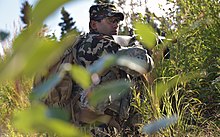

Military education and training is a process which intends to establish and improve the capabilities of military personnel in their respective roles. Military training may be voluntary or compulsory duty. It begins with recruit training, proceeds to education and training specific to military roles, and sometimes includes additional training during a military career. Directing staff are the military personnel who comprise the instructional staff at a military training institution.
In some countries, military education and training are parts of the compulsory education. The organizers believe that military education can bring some benefits and experiences that cannot be obtained from normal class like setback education. Moreover, participants are able to learn survival skills during the military education, like co-operations and resilience, which help participants improve the capabilities of military personnel in their respective roles.
Recruit training
Main article: Recruit training
The primary and initial form of military training, recruit training, makes use of various conditioning techniques to resocialize trainees into a military system, to ensure that they will obey all orders without hesitation, and to teach basic military skills. Resocialization as a sociological concept involves the process of mentally and emotionally "retraining" individuals so that they can operate in a new environment; it promotes changes to an individual's attitudes and behaviours. The drill instructor has the task of making the service members fit for military use.
Role-specific training
After their recruit training, personnel may undergo further training specific to their military role, including the use of any specialist equipment. They are then normally deemed fit for military service.

Further training
Military personnel may continue to receive training during their career.

See also
References
- Australia, Department of Defence (2006). "Final report of the Learning Culture Inquiry" (PDF). Retrieved 2017-07-01.
- Winslow, Donna (2004). "Misplaced Loyalties: The Role of Military Culture in the Breakdown of Discipline in Two Peace Operations". Journal of Military and Strategic Studies. 6 (3). ISSN 1488-559X. Archived from the original on 2017-12-24. Retrieved 2018-02-19.
- McGurk; et al. (2006). 'Joining the ranks: The role of indoctrination in transforming civilians to service members', (in 'Military life: The psychology of serving in peace and combat '). Westport: Praeger Security International. pp. 13–31. ISBN 978-0275983024.
- Dave, Grossman (2009). On killing : the psychological cost of learning to kill in war and society (Rev. ed.). New York: Little, Brown and Co. ISBN 9780316040938. OCLC 427757599.
- John., Hockey (1986). Squaddies : portrait of a subculture. Exeter, Devon: University of Exeter. ISBN 9780859892483. OCLC 25283124.
